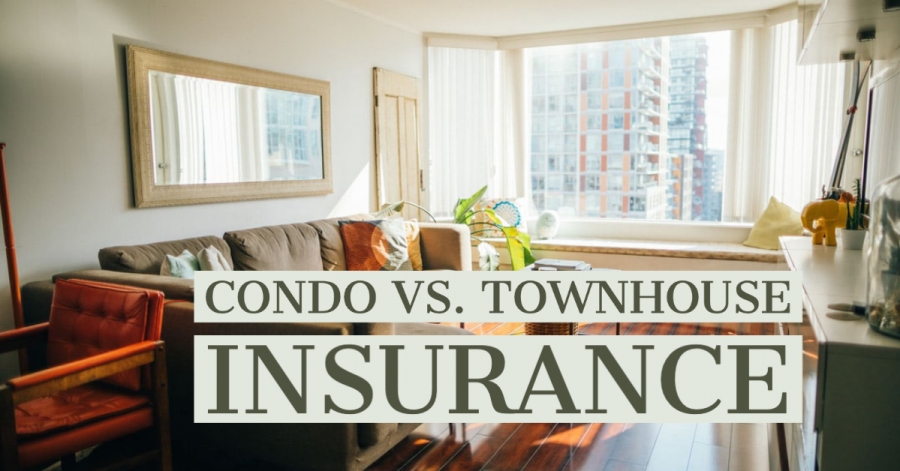Condominiums and Townhouses are popular property types for certain home buyers. Lower cost and reduced maintenance make these properties ideal for first time home buyers, downsizing seniors, and anybody looking to simplify their lifestyle.
When it comes to Condos vs. Townhouses they are actually very different but do share many similarities like common walls, common areas, shared amenities, and a homeowners association. The Homeowners Association or HOA is the most important similarity, especially when it comes to how these property types are insured.
Condominium Ownership
Condominiums are really more of a type of ownership. Some describe a condo as an apartment that you own. In a condo what you own is everything inside the walls of your unit including cabinets, countertops, appliances, fixtures, etc… The condo owner shares equal ownership in all of the common elements of their community with the rest of the owners in the development.
Townhouse Ownership
The townhouse owner normally owns the entire structure including the land the structure is built on. The townhouse is ultimately more of an architectural style think of them as a modern version of the row houses or brownstone buildings found primarily on the east coast.
Homeowners Association
The HOA and accompanying bylaws and covenants are what ultimately determine the type of insurance policy required by the condo and townhouse owner.
Homeowners Associations consist of a board, the members of this board come from the resident owners. The board is responsible for maintaining the common elements of the community as directed in the communities bylaws. The bylaws spell out how the board will operate as well as what they are responsible for including insurance.
The covenants are the rules of the community and the bylaws appoint the board of directors to enforce these rules. In these covenants are the details of what policy types the association is responsible for as well as what the individual unit owners are responsible for.
Condominium Insurance
In a condo association the board will purchase a “Master Association” policy in order to cover the structures and common elements of the community. The homeowner is usually responsible for covering the inside of their unit. This means all fixtures like cabinets, countertops, appliances, and personal property should be covered. This type of policy is called an HO-6 and in addition to covering the interior of the unit also covers the owner against liability and medical in the event someone gets injured in the unit.
Townhouse Insurance
The townhouse community also has an HOA and a board of directors. Because of the way a townhouse is usually owner, the townhouse board generally has less responsibility than the condo board. Townhouse communities generally have fewer common areas and amenities to be responsible for.
The board will still require a master policy for the common elements of the community but the individual structures become the responsibility of the individual homeowners. A townhouse policy covers the entire structure along with any associated additional structures owned by the policyholder. The most common townhouse policy is called an HO-3, this policy has much more in common with a traditional single-family HO-5.
There are exceptions in the case of townhouses. In some instances, the association is responsible for the exterior maintenance of the townhouse. In these cases, the owner would most likely be required to have an HO-6 condo type policy in place, to cover the inside of the unit as well as fixtures and belongings.
Dues, Reserve Funds and Special Assessments
The owners of both condos and townhomes both pay regular dues to their respective associations. These dues go to cover the costs associated with maintenance and insurance of the properties. A small percentage of each regular dues payment should go into a “reserve fund”. This reserve fund is set up to cover regularly recurring maintenance costs for things like painting and repaving. The fund is also there to cover catastrophic events and emergencies.
The reserve fund is often neglected or underfunded, especially in states the don’t have regulations regarding the maintenance of reserve funds. This can be a real problem, especially for the owner of a townhouse in a community where the HOA handles the exterior maintenance.
The unit owners in any condo or townhouse development are ultimately responsible for the maintenance of the community. In the event, the community’s current accounts are not able to fund a necessary project, the board may implement something called a “Special Assessment”. This is a fee assessed to the owners of a condo or townhouse development in order to cover the cost of a repair or maintenance issue for which the association doesn’t currently have the money to pay for.
In the case of the homeowner, this fee can be a very nasty surprise. Depending on the severity of the repair and the condition of the HOA’s accounts, the owner can be looking at a substantial amount of money, in some cases $5,000 to $10,000 dollars.
There are several measures the homeowner can take in order to avoid facing this scenario. The first thing to be aware of is the status of the reserve fund. Before you ever purchase a condo or townhouse, it pays to check on the reserve fund. Make sure there are funds in the account. Another good practice is to check and see if the association regularly participates in a professional reserve study, and if they do do they adhere to the advice?
A professional reserve study looks at the structures, infrastructure, and common areas of the community and estimates when repair or maintenance will be required. The study estimates costs associated with these repairs and maintenance issues and advise the association as to how much they will need in reserves.
Associations that have minimal reserve funds or don’t adhere to a regular reserve study are a dangerous investment for home buyers.
The final option a homeowner can take to protect themselves from unwanted assessments is to add “Loss Assessment” coverage to your condo or townhouse policy. Loss assessment coverage provides additional protections for homeowners in case of an unexpected assessment. This type of coverage protects the owner from potentially devastating assessments and the best of all, this additional coverage is relatively low cost.
In Conclusion
Condominiums and Townhouses can be a great way to get into an affordable, low maintenance lifestyle. Just make sure you understand the types of insurance coverage and the potential problems associated with Homeowners Associations and Special Assessments.









